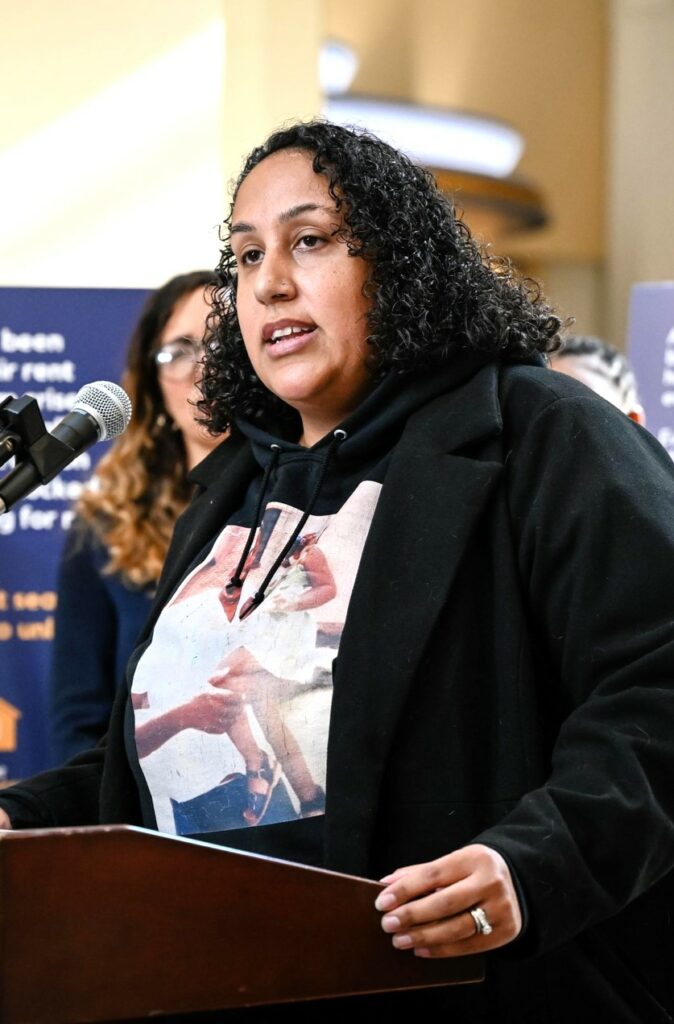Pennsylvania’s practice of keeping eviction records public by default is unconscionable, state Rep. Ismail Smith-Wade-El said.
No family should have to worry that an old or inaccurate eviction record “will prevent them from keeping their family — their kids — safe, warm and dry,” the Lancaster County lawmaker said at a media conference at the Capitol Monday.
Joined by fellow Democrats, Smith-Wade-El was there to promote the Fair Access Housing Bill. He is the principal sponsor of the legislation, which he plans to introduce shortly.
Eviction filings stay on the books indefinitely in Pennsylvania: Even when they’re inaccurate or incomplete, even when the case was withdrawn, even when the tenant won in court. Tenants with any history of eviction often find themselves screened out when they apply for new rentals, forcing them to rent from landlords who are less choosy — often because their properties are in poor repair or otherwise substandard.
Smith-Wade-El’s legislation would require most eviction records to be sealed. The main exception would be filings that result in a court ruling in favor of a landlord. Those records would remain public for four years.
Individual records would remain accessible to the parties involved in eviction cases and could also be unsealed on a case-by-case basis court order.
Advocacy groups say keeping eviction records accessible traps vulnerable households in a cycle of instability and contributes to racial and economic inequity. Those affected are disproportionately Black, Latino and female.
In the sponsorship memorandum explaining his bill, Smith-Wade-El references a policy paper co-authored by PolicyLink and Community Legal Services of Philadelphia, titled “Advancing Pennsylvania’s Housing Futures: Sealing Eviction Records for Housing Stability and Economic Prosperity.”
“A single eviction record,” it says, “can cause irreparable harm to the lives of mothers and their children, disrupt workforce development for large swaths of communities, and strain existing social support systems throughout the state.”
For victims of domestic violence, the effect can be especially pernicious. Smith-Wade-El says he met such a woman a couple of years ago, who was unable to find housing due to an eviction incurred four years earlier when she was fleeing her abusive boyfriend.
Evictions were largely suspended during the pandemic but have rebounded since restrictions were lifted. In the 12 months ending in mid-September, there were more than 4,900 eviction filings in Lancaster County and about 114,000 statewide, according to state data.

Joining Smith-Wade-El on Monday were a number of Democratic colleagues and Dominique Wiggins, a supervising attorney with Community Legal Services.
Having an eviction record makes finding housing “infinitely more difficult,” but it doesn’t have to be that way, Wiggins said: “We know the value of second chances.”
When children are forced out of their homes due to a parent’s eviction, “it turns their whole world upside down,” said state Rep. Elizabeth Fiedler, D-Philadelphia, who introduced a previous version of the bill in 2020. “No one wants that to happen.”

Katrina Holmes, who was just elected to the School District of Lancaster board, said her family just received a notice giving them 45 days to move. Housing insecurity, including the prospect of eviction, is a real and ever-present worry for households like hers, she said.
Nationwide, 15 states have implemented rules sealing or expunging eviction records or limiting how landlords can screen tenants, according to PolicyLink’s and Community Legal Services’ report.
Landlord advocacy groups have tended to push back against laws that seal evictions, arguing that they protect bad tenants to the detriment of good ones and that landlords have a legitimate interest in eviction records as one component of their overall evaluation of applicants.
In 2021 Philadelphia passed a measure barring landlords from using evictions as the sole reason to reject a rental application and required them to provide tenants reasons for a denial.
By and large, landlords have been OK with that framework, in part because they can still see eviction records if they choose to, Andre Del Valle, vice president of government affairs for the Pennsylvania Apartment Association, told the Philadelphia Inquirer.
Preventing landlords from seeing eviction records altogether would be another matter, and would be a concern, he said. The association did not immediately respond to a request for additional comment.
Smith-Wade-El cited the example of Pennsylvania’s Clean Slate Law, the first of its kind in the U.S. Intended to keep people from being automatically disqualified for housing, jobs, loans and so on due to a criminal record, it allows many nonviolent summary and misdemeanor cases to be sealed automatically, rather than requiring individuals to petition a court.
Through April 2022, more than 40 million cases involving 1.2 million people had been sealed.
“We can do the same” for evictions, Smith-Wade-El said.






